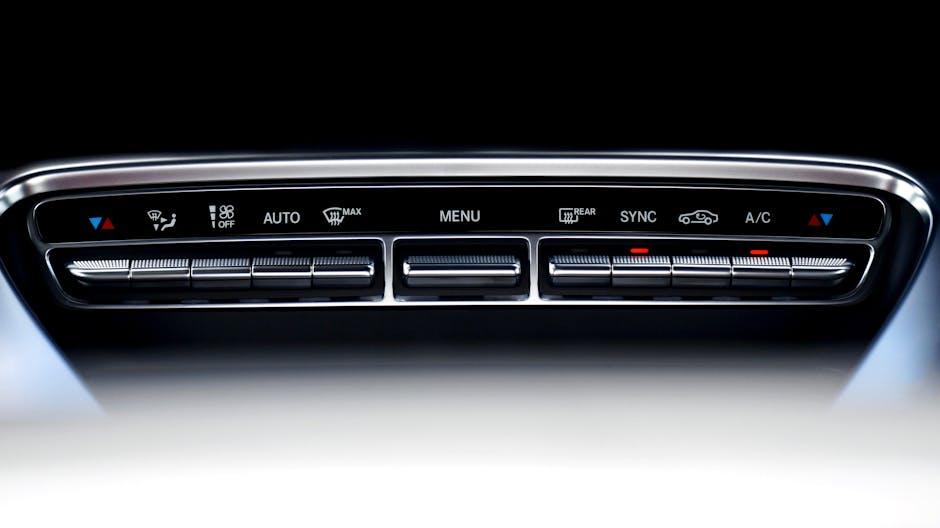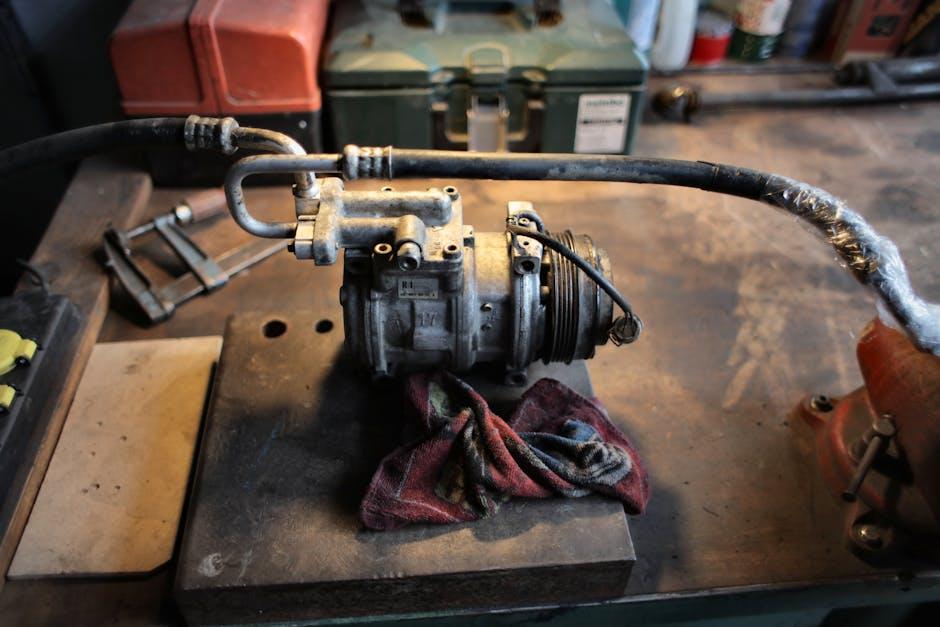Imagine stepping into your car on a blistering summer day, only to be greeted by a rush of cool, refreshing air that instantly melts away the heat. Behind this comfort lies a vital, yet often overlooked component—the AC compressor. Acting as the heart of your vehicle’s air conditioning system, the AC compressor works silently to circulate refrigerant, enabling that crisp chill you rely on. In this article, we’ll explore the essential role the AC compressor plays in keeping your ride comfortable, how it functions, and why maintaining it is key to a smooth and cool driving experience.
Table of Contents
- Understanding the AC Compressor and Its Core Functionality
- Signs Your AC Compressor Needs Immediate Attention
- How the AC Compressor Impacts Overall Vehicle Performance
- Choosing the Right Replacement Compressor for Your Car
- Maintenance Tips to Extend the Life of Your AC Compressor
- Common Mistakes to Avoid When Servicing Your Vehicle’s AC System
- Q&A
- The Way Forward

Understanding the AC Compressor and Its Core Functionality
The AC compressor acts as the heart of your vehicle’s air conditioning system, responsible for circulating refrigerant through the AC cycle to cool the cabin efficiently. By compressing low-pressure refrigerant gas into a high-pressure, high-temperature gas, it enables the refrigerant to release heat once it reaches the condenser. This process is crucial, as it transforms the refrigerant into a liquid state, setting the stage for the cooling effect you enjoy inside your car. Without the compressor’s power and precision, the entire cooling mechanism would fail to function.
At its core, the compressor relies on several key functions to operate seamlessly:
- Compression: Elevates refrigerant pressure, transforming gas to liquid.
- Circulation: Moves refrigerant continuously throughout the system.
- Regulation: Maintains desired pressure levels to optimize cooling.
| Component | Role |
|---|---|
| Clutch | Engages/disengages compressor based on cooling needs |
| Pulley | Driven by engine belt, powers the compressor |
| Valves | Control refrigerant flow direction and pressure |

Signs Your AC Compressor Needs Immediate Attention
When your vehicle’s AC compressor starts showing warning signals, this is not the time to ignore them. One clear indication is unusual noises like grinding, squealing, or rattling, which often suggest worn-out bearings or internal damage. Another common symptom is a lack of cold air even when the AC is running at full blast, hinting that the compressor is struggling to circulate refrigerant properly. Sometimes, you may also notice the compressor clutch failing to engage or constantly cycling on and off, which disrupts the cooling process and may lead to system overheating.
Below is a quick checklist of telltale signs that demand swift mechanic attention to avoid costly repairs or complete system failure:
- Intermittent Cooling: Air temperature fluctuates unpredictably.
- Visible Leaks: Refrigerant oil spots under the vehicle.
- Burning Smell: Overheating components emitting a scorched odor.
- Increased Engine Load: Reduced fuel efficiency due to compressor strain.
| Symptom | Possible Cause | Recommended Action |
|---|---|---|
| Strange noises | Damaged bearings or internal wear | Inspect and repair or replace compressor |
| Weak or warm airflow | Refrigerant circulation failure | Check refrigerant levels and compressor effectiveness |
| Clutch fails to engage | Electrical or mechanical failure | Test clutch and electrical system |

How the AC Compressor Impacts Overall Vehicle Performance
Beyond simply cooling the cabin, the AC compressor plays a crucial role in maintaining the overall efficiency and longevity of your vehicle’s engine. When the compressor operates smoothly, it reduces the engine’s workload by efficiently circulating refrigerant and minimizing energy loss. Conversely, a failing compressor can cause the engine to overexert, leading to reduced fuel economy and increased emissions. This subtle but significant impact means that what might seem like just a comfort feature actually contributes directly to your car’s performance and environmental footprint.
Here’s a quick look at the primary ways the AC compressor influences your vehicle’s behavior:
- Engine Load: A well-functioning compressor syncs with the engine, reducing strain during operation.
- Fuel Efficiency: Efficient refrigerant circulation helps conserve fuel during AC use.
- Component Longevity: Prevents overheating of engine parts by maintaining optimal temperatures.
- Drive Comfort: Ensures consistent cabin cooling without sudden engine power fluctuations.
| Effect | Impact on Vehicle |
|---|---|
| Increased Compressor Drag | Lower Fuel Economy |
| Compressor Failure | Engine Overheating Risk |
| Efficient Compressor | Optimized Engine Performance |
| Regular Maintenance | Prolonged AC & Engine Life |

Choosing the Right Replacement Compressor for Your Car
When selecting a replacement compressor for your car, it’s crucial to consider the specific requirements of your vehicle’s AC system. Compressors vary widely in terms of capacity, compatibility, and technology. Opting for a compressor that matches or exceeds the specifications of the original equipment ensures efficient cooling and reduces the risk of premature failure. Pay attention to the refrigerant type your car uses (such as R134a or R1234yf), as compatibility with the compressor is essential for optimal performance and environmental compliance.
Other factors to keep in mind include warranty coverage, brand reputation, and installation ease. A quality replacement compressor will not only restore the function but also improve the longevity of your AC system. Below is a quick guide to help you evaluate key features:
| Feature | Why It Matters | Tips |
|---|---|---|
| Compressor Size | Ensures proper refrigerant flow and pressure | Match size to OEM specifications |
| Type of Drive | Compatibility with engine belt system | Check if your car uses serpentine or V-belt drives |
| Refrigerant Compatibility | Affects environmental impact and cooling efficiency | Confirm refrigerant used in your vehicle’s AC system |
| Warranty | Protection against early failures | Choose brands offering at least 1 year warranty |

Maintenance Tips to Extend the Life of Your AC Compressor
Taking care of your vehicle’s AC compressor is crucial for ensuring cool and comfortable drives, especially during the hottest months. Regular maintenance can save you from costly repairs and premature replacements. Start by checking the refrigerant levels frequently, as low refrigerant can force the compressor to work harder, reducing its lifespan. Additionally, ensure that the compressor’s belt is inspected for any signs of wear or cracking, since a loose or damaged belt can lead to inefficient operation or failure.
Incorporating a few simple habits into your routine can make a significant difference. Consider the following tips:
- Keep the condenser clean: Dirt and debris can block airflow, putting extra stress on the compressor.
- Run the AC regularly: Even in cooler months, this helps keep the compressor seals lubricated and prevents corrosion.
- Address leaks promptly: Any sign of refrigerant leaks should be repaired immediately to avoid strain on the compressor.
| Maintenance Task | Recommended Frequency | Benefit |
|---|---|---|
| Refrigerant Check | Every 6 months | Prevents compressor strain |
| Belt Inspection | Every 12 months | Ensures smooth operation |
| Condenser Cleaning | Every 3 months | Maintains airflow efficiency |

Common Mistakes to Avoid When Servicing Your Vehicle’s AC System
When servicing your vehicle’s AC system, one of the most frequent errors is overlooking the importance of using the right refrigerant type and quantity. Injecting too much or too little refrigerant can put unnecessary strain on the AC compressor, leading to premature wear or even failure. Additionally, neglecting to check for leaks before recharging the system can cause the new refrigerant to escape quickly, rendering your efforts futile. Remember, consistency in maintenance means regularly inspecting hoses, seals, and connections to ensure everything remains airtight.
Another common pitfall is skipping the replacement or cleaning of the AC system’s components such as the receiver-drier or cabin air filter, which can impede the compressor’s efficiency. Clogged filters or moisture-laden parts cause the compressor to work harder, which not only decreases performance but can also lead to internal damage. To ensure longevity and optimal function, always:
- Use manufacturer-recommended parts and refrigerants
- Perform routine leak checks and pressure tests
- Replace filters and drying components as advised
Q&A
Q&A: The Role of the AC Compressor in Your Vehicle
Q1: What exactly is an AC compressor in a car?
A1: Think of the AC compressor as the heart of your vehicle’s air conditioning system. It’s a mechanical pump that pressurizes and circulates the refrigerant, turning warm air inside your car into the refreshing cool breeze that keeps you comfortable.
Q2: How does the AC compressor make my car’s air cold?
A2: The AC compressor compresses the refrigerant gas, increasing its pressure and temperature. This hot, high-pressure refrigerant then flows through the condenser where it cools down and transforms into a liquid. As it moves through the evaporator inside your car, the refrigerant evaporates back into gas, absorbing heat from the cabin air—and voilà!—cool air is born.
Q3: Why is the AC compressor so important?
A3: Without the compressor, the refrigeration cycle can’t start. It’s the component that keeps the refrigerant moving and changing states—critical for transforming the summer furnace inside your car into a cool oasis. Without it, your AC system is just a set of pipes and fans, unable to cool.
Q4: What happens if the AC compressor fails?
A4: If your AC compressor stops working, you might notice the air blowing out of your vents but it won’t be cold. Other signs include strange noises, leaking refrigerant, or the compressor clutch not engaging. Ultimately, a failing compressor means your car’s cooling system is on the fritz, and it’s time for a mechanic’s intervention.
Q5: Can I drive with a broken AC compressor?
A5: Technically yes, but it’s not comfortable. More importantly, driving with a damaged compressor can harm other parts of the AC system. If you suspect compressor trouble, it’s best to get it checked out sooner rather than later to avoid costly repairs.
Q6: How can I keep my AC compressor healthy?
A6: Regular maintenance is key. Make sure your refrigerant levels are topped up, keep the system clean, and listen for unusual noises. A yearly inspection can catch issues early, helping your compressor—and your comfort—last for many miles.
Q7: Is replacing the AC compressor expensive?
A7: Replacement costs can vary widely based on your vehicle make and model. It’s typically a more involved repair because it requires evacuating and recharging the refrigerant system. Still, investing in a good compressor means beating the heat without breaking the bank from ongoing cooling troubles.
Q8: Does the AC compressor affect fuel economy?
A8: Yes, running the AC compressor uses power from your engine, which can slightly reduce fuel efficiency. However, modern compressors are designed to minimize drag, so the tradeoff is usually worth the cooling comfort on hot days.
This Q&A unpacks the vital role of the AC compressor, showing how it’s the invisible engine behind your vehicle’s cool air and why keeping it in shape is key to a breezy ride.
The Way Forward
In the intricate dance of your vehicle’s air conditioning system, the AC compressor plays a starring role—silently working behind the scenes to keep your ride cool and comfortable. Understanding this vital component not only demystifies a key part of your car’s functionality but also empowers you to recognize when it needs care. So next time you feel that refreshing breeze on a scorching day, remember the compressor’s silent hum—a small but mighty guardian of your comfort on the road.

